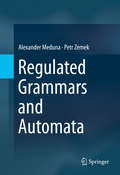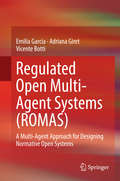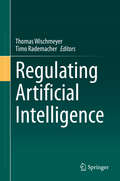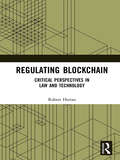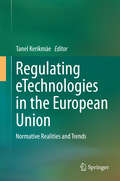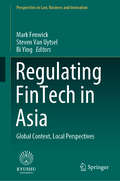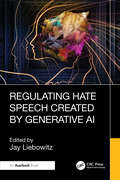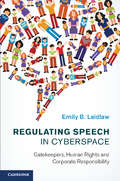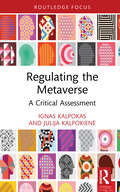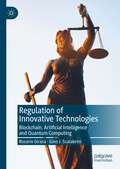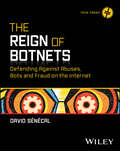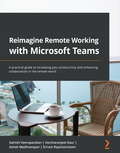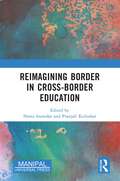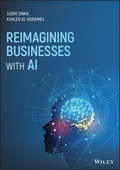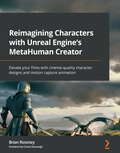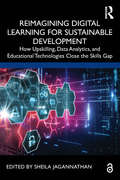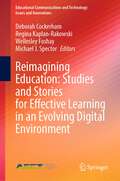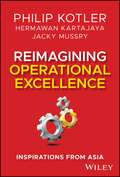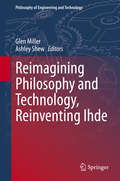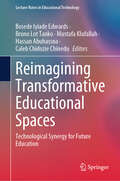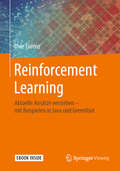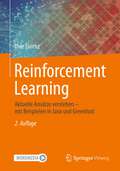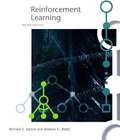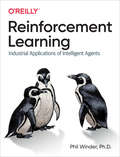- Table View
- List View
Regulated Grammars and Automata
by Alexander Meduna Petr ZemekThis is the first book to offer key theoretical topics and terminology concerning regulated grammars and automata. They are the most important language-defining devices that work under controls represented by additional mathematical mechanisms. Key topics include formal language theory, grammatical regulation, grammar systems, erasing rules, parallelism, word monoids, regulated and unregulated automata and control languages. The book explores how the information utilized in computer science is most often represented by formal languages defined by appropriate formal devices. It provides both algorithms and a variety of real-world applications, allowing readers to understand both theoretical concepts and fundamentals. There is a special focus on applications to scientific fields including biology, linguistics and informatics. This book concludes with case studies and future trends for the field. Regulated Grammars and Automata is designed as a reference for researchers and professionals working in computer science and mathematics who deal with language processors. Advanced-level students in computer science and mathematics will also find this book a valuable resource as a secondary textbook or reference.
Regulated Open Multi-Agent Systems (ROMAS)
by Emilia Garcia Adriana Giret Vicente BottiAddressing the open problem of engineering normative open systems using the multi-agent paradigm, normative open systems are explained as systems in which heterogeneous and autonomous entities and institutions coexist in a complex social and legal framework that can evolve to address the different and often conflicting objectives of the many stakeholders involved. Presenting a software engineering approach which covers both the analysis and design of these kinds of systems, and which deals with the open issues in the area, ROMAS (Regulated Open Multi-Agent Systems) defines a specific multi-agent architecture, meta-model, methodology and CASE tool. This CASE tool is based on Model-Driven technology and integrates the graphical design with the formal verification of some properties of these systems by means of model checking techniques. Utilizing tables to enhance reader insights into the most important requirements for designing normative open multi-agent systems, the book also provides a detailed and easy to understand description of the ROMAS approach and the advantages of using ROMAS. This method is illustrated with case studies, in which the reader may develop a comprehensive understanding of applying ROMAS to a given problem. The case studies are presented with illustrations of the developments. Reading this book will help readers to understand the increasing demand for normative open systems and their development requirements; understand how multi-agent systems approaches can be used to deal with the development of systems of this kind; to learn an easy to use and complete engineering method for large-scale and complex normative systems and to recognize how Model-Driven technology can be used to integrate the analysis, design, verification and implementation of multi-agent systems.
Regulating Artificial Intelligence
by Thomas Wischmeyer Timo RademacherThis book assesses the normative and practical challenges for artificial intelligence (AI) regulation, offers comprehensive information on the laws that currently shape or restrict the design or use of AI, and develops policy recommendations for those areas in which regulation is most urgently needed. By gathering contributions from scholars who are experts in their respective fields of legal research, it demonstrates that AI regulation is not a specialized sub-discipline, but affects the entire legal system and thus concerns all lawyers. Machine learning-based technology, which lies at the heart of what is commonly referred to as AI, is increasingly being employed to make policy and business decisions with broad social impacts, and therefore runs the risk of causing wide-scale damage. At the same time, AI technology is becoming more and more complex and difficult to understand, making it harder to determine whether or not it is being used in accordance with the law. In light of this situation, even tech enthusiasts are calling for stricter regulation of AI. Legislators, too, are stepping in and have begun to pass AI laws, including the prohibition of automated decision-making systems in Article 22 of the General Data Protection Regulation, the New York City AI transparency bill, and the 2017 amendments to the German Cartel Act and German Administrative Procedure Act. While the belief that something needs to be done is widely shared, there is far less clarity about what exactly can or should be done, or what effective regulation might look like. The book is divided into two major parts, the first of which focuses on features common to most AI systems, and explores how they relate to the legal framework for data-driven technologies, which already exists in the form of (national and supra-national) constitutional law, EU data protection and competition law, and anti-discrimination law. In the second part, the book examines in detail a number of relevant sectors in which AI is increasingly shaping decision-making processes, ranging from the notorious social media and the legal, financial and healthcare industries, to fields like law enforcement and tax law, in which we can observe how regulation by AI is becoming a reality.
Regulating Blockchain: Critical Perspectives in Law and Technology
by Robert HerianAs the distributed architecture underpinning the initial Bitcoin anarcho-capitalist, libertarian project, 'blockchain' entered wider public imagination and vocabulary only very recently. Yet in a short space of time it has become more mainstream and synonymous with a spectacular variety of commercial and civic 'problem'/'solution' concepts and ideals. From commodity provenance, to electoral fraud prevention, to a wholesale decentralisation of power and the banishing of the exploitative practices of 'middlemen', blockchain stakeholders are nothing short of evangelical in their belief that it is a force for good. For these reasons and more the technology has captured the attention of entrepreneurs, venture capitalists, global corporations and governments the world over. Blockchain may indeed offer a unique technical opportunity to change cultures of transparency and trust within cyberspace, and as ‘revolutionary’ and ‘disruptive’ has the potential to shift global socioeconomic and political conventions. But as a yet largely unregulated, solutionist-driven phenomenon, blockchain exists squarely within the boundaries of capitalist logic and reason, fast becoming central to the business models of many sources of financial and political power the technology was specifically designed to undo, and increasingly allied to neoliberal strategies with scant regard for collective, political or democratic accountability in the public interest. Regulating Blockchain casts a critical eye over the technology, its ‘ecosystem’ of stakeholders, and offers a challenge to the prevailing discourse proclaiming it to be the great techno-social enabler of our times.
Regulating eTechnologies in the European Union
by Tanel KerikmäeThe EU strategy 2020 includes ambitious plans for e-regulation that could improve Europe's competitiveness. However, the European states have very different legal frameworks in this field. This book introduces flagship initiatives and provides a detailed overview and analysis of the current standards and latest developments, offering practical insights and guidelines for practitioners and policy-makers alike. Further, as it discusses the main areas of e-regulation, it can serve as a useful platform for university education in light of the growing need for new kinds of specialists, i. e. IT lawyers. The book concentrates on fields that are directly affected by e-regulation such as cyber-security, databases, computer programs, e-governance, IP and competition law and informatics.
Regulating FinTech in Asia: Global Context, Local Perspectives (Perspectives in Law, Business and Innovation)
by Mark Fenwick Steven Van Uytsel Bi YingThis book focuses on Fintech regulation in Asian, situating local developments in broader economic, regulatory and technological contexts. Over the last decade, Fintech – broadly defined as the use of new information technologies to help financial institutions and intermediaries compete in the marketplace – has disrupted the financial services sector. Like other 21st century technological developments, Fintech is a global phenomenon that plays out in local economic, political and regulatory contexts, and this dynamic interplay between global trends and local circumstances has created a complex and fast-changing landscape. Diverse stakeholders (most obviously incumbent financial service providers, tech start-ups and regulators) all pursue a competitive edge against a background of profound uncertainty about the future direction and possible effects of multiple emerging technologies. Compounding these difficulties are uncertainties surrounding regulatory responses. Policymakers often struggle to identify appropriate regulatory responses and increasingly turn to policy experimentation. Such issues add to the challenges for the various actors operating in the Fintech space. This situation is particularly fluid in Asia, since many jurisdictions are seeking to establish themselves as a regional hub for new financial services.
Regulating Hate Speech Created by Generative AI
by Jay LiebowitzRegulating Hate Speech Created by Generative AI explores the new hybrid space of Human Machine Interaction (HMI) in which hate speech is represented and computed through algorithms and AI generative systems. The book is exploratory because there are still many problem-solving challenges to be faced. It is also innovative because it is not assuming that solutions lie only in technological advancements but on a broader scale. In this sense, large language models can and are being considered from a holistic view (i.e., from the different dimensions and layers of regulatory and legal governance). Highlights of the book include: Generative AI and social engines of hate An introduction to generative Artificial Intelligence application, trends, and ethics The mechanics and validation of generative AI outcomes An evaluation of Generative AI for hate speech detection Best practices and key considerations for AI regulation Using GenAI capabilities for early detection of threats in the digital environment. This book is a hard look at ways to regulate generative AI to reduce online hate and secure justice in a digital environment. Featuring research and offering practical guidelines, the book examines guidelines for regulating generative AI models, so they do not contribute to online hate disinformation and imagery.
Regulating Speech in Cyberspace
by Emily B. LaidlawPrivate companies exert considerable control over the flow of information on the internet. Whether users are finding information with a search engine, communicating on a social networking site or accessing the internet through an ISP, access to participation can be blocked, channelled, edited or personalised. Such gatekeepers are powerful forces in facilitating or hindering freedom of expression online. This is problematic for a human rights system which has historically treated human rights as a government responsibility, and this is compounded by the largely light-touch regulatory approach to the internet in the west. Regulating Speech in Cyberspace explores how these gatekeepers operate at the intersection of three fields of study: regulation (more broadly, law), corporate social responsibility and human rights. It proposes an alternative corporate governance model for speech regulation, one that acts as a template for the increasingly common use of non-state-based models of governance for human rights.
Regulating the Metaverse: A Critical Assessment (Routledge Research in the Law of Emerging Technologies)
by Ignas Kalpokas Julija KalpokienėThe metaverse seems to be on everybody’s lips – and yet, very few people can actually explain what it means or why it is important. This book aims to fill the gap from an interdisciplinary perspective informed by law and media and communications studies. Going beyond the optimism emanating from technology companies and venture capitalists, the authors critically evaluate the antecedents and the building blocks of the metaverse, the design and regulatory challenges that need to be solved, and commercial opportunities that are yet to be fully realised. While the metaverse is poised to open new possibilities and perspectives, it will also be a dangerous place – one ripe with threats ranging from disinformation to intellectual property theft to sexual harassment. Hence, the book offers a useful guide to the legal and political governance issues ahead while also contextualising them within the broader domain of governance and regulation of digital technologies.
Regulation Fixtures in Hydronic Heating Installations: Types, Structures, Characteristics and Applications (Studies in Systems, Decision and Control #187)
by Damian Piotr MuniakThe book focuses on design and computational issues related to fixtures and armatures in hydronic heating installations, especially regulation valves, their selection, operating principles, types and construction. The analysis is complemented by connection diagrams, drawings, photos of the valves and computational examples of their selection and operation parameters when used in a pipework and a controlled object, like a radiator. It also discusses issues related to the so-called valve authority, one of the main parameters determining the quality of the valve regulation process. Further, it includes an extensive theoretical framework along with a detailed mathematical analysis and proposes new algorithms, which have been verified and confirmed experimentally. Based on this analysis, the book presents the author’s analytical approach for sizing a regulation valve, as well as an innovative design solution for a regulation valve without the limitations of the valves currently available on the market. Lastly, it introduces a new verified method of calculating the valve pre-setting. Intended for engineers dealing with heating issues, scientists and students studying environmental engineering, energetics and related fields, the book is also useful for lecturers, designers, and those operating heating installations, as well as authors of computer programs for thermal and hydraulic balancing of heating installations.
Regulation of Innovative Technologies: Blockchain, Artificial Intelligence and Quantum Computing
by Rosario Girasa Gino J. ScalabriniThis book explores the regulation of emerging technologies. Developments such as bitcoin (based on blockchain technology), artificial intelligence, quantum computing, and other technical advances have the potential to revolutionize many aspects of everyday life. As with other significant occurrences, especially when coupled by financial rewards, there are the inevitable attempts to reap gains unlawfully. This book examines the legal and regulatory enactments that attempt to undermine the risks to society as well as the dangers to individual freedoms that the technologies present when abused by governmental and non-governmental authorities. Included are discussions of the dangers to the right of privacy posed by facial recognition, physical location tracking, automated license plate recognition (ALPR) and other evolving applications of technology. This book is an invaluable resource for those interested in the regulation of emerging technologies particularly as they relate to blockchain, artificial intelligence, and the most current advances in quantum computing. Emphasis is focused on invasion of privacy, particularly by government authorities, antitrust implications of private companies and the efforts of international entities to counter alleged abuses by them.
The Reign of Botnets: Defending Against Abuses, Bots and Fraud on the Internet (Tech Today)
by David SenecalA top-to-bottom discussion of website bot attacks and how to defend against them In The Reign of Botnets: Defending Against Abuses, Bots and Fraud on the Internet, fraud and bot detection expert David Senecal delivers a timely and incisive presentation of the contemporary bot threat landscape and the latest defense strategies used by leading companies to protect themselves. The author uses plain language to lift the veil on bots and fraud, making a topic critical to your website's security easy to understand and even easier to implement. You'll learn how attackers think, what motivates them, how their strategies have evolved over time, and how website owners have changed their own behaviors to keep up with their adversaries. You'll also discover how you can best respond to patterns and incidents that pose a threat to your site, your business, and your customers. The book includes: A description of common bot detection techniques exploring the difference between positive and negative security strategies and other key concepts A method for assessing and analyzing bot activity, to evaluate the accuracy of the detection and understand the botnet sophistication A discussion about the challenge of data collection for the purpose of providing security and balancing the ever-present needs for user privacy Ideal for web security practitioners and website administrators, The Reign of Botnets is the perfect resource for anyone interested in learning more about web security. It's a can't-miss book for experienced professionals and total novices alike.
Reimagine Remote Working with Microsoft Teams: A practical guide to increasing your productivity and enhancing collaboration in the remote world
by Sathish Veerapandian Harsharanjeet Kaur Ashok Madhvarayan Sriram RajamanickamGet a 360-degree view of Teams as a secure collaboration tool with best practices and recommendations for using Teams efficientlyKey FeaturesMaster and manage virtual meetings easily using TeamsUnderstand the essential security and administration aspects of Microsoft TeamsCommunicate and collaborate effectively with your colleagues using Teams and M365 apps such as Sway, Yammer, and StreamBook DescriptionThe outbreak of the pandemic has forced the world to embrace remote working and the modern style of virtual business. However, end users may find it challenging to cope with this sudden change in working style, not aware of all the features and remote working tools available to make their life easy. Microsoft Teams is an exceptional platform, adopted by many organizations for unified communication and collaboration, and this book will help you to make the most of its capabilities. Complete with step-by-step explanations and screenshots, this book guides you through the topics that you'll find useful in your daily use of Teams. You'll learn how to manage your teams and projects with Microsoft Teams in a structured and organized way. The book provides hands-on information with a focus on the end user side to help corporate users to increase productivity and become a Microsoft Teams superuser. Finally, you'll explore the most effective ways of using the app with best practices and tips and tricks for making the most of the features available for your scenario. By the end of this Microsoft Teams book, you'll have mastered Microsoft Teams and be fully equipped as a modern collaboration end user to effectively increase your remote work productivity.What you will learnFind out how to secure your documents and data with Microsoft's securityImprove your organization's productivity and engagement with Microsoft TeamsIntegrate Teams with other Office 365 apps such as SharePoint, OneNote, and OneDriveAutomate your regular tasks with easy end-user automation optionsDiscover best practices and etiquettes for using Teams efficiently and effectivelyExplore tips and tricks from expert MVP and Microsoft Certified Trainer (MCT) authorsWho this book is forThis book for anyone who wants to improve their day-to-day productivity using Microsoft Teams. Anyone with access to Office 365 apps will find this book useful irrespective of their designations. Fundamental knowledge of Microsoft Office 365 Applications is required.
Reimagining Border in Cross-border Education
by Neeta Inamdar Pranjali KirloskarUniversities are inherently and definitionally universal in their quest for the creation and dissemination of knowledge. They are set to defy borders that exist in parochial forms. Globalization which opened up borders has by design or default created inequalities and imbalances in knowledge systems. Undoubtedly, knowledge is power but there is difference in the power that is intrinsic to it and the power that is ascribed which is determined by dominant political and economic hierarchies. If knowledge predominantly flows from global north to global south, people seeking knowledge move from global south to global north. These imbalances are also seen within these regions, between cultures and communities, one claiming superiority over the other. These realities call for a reassessment of not only what constitutes knowledge, but also what encompasses the idea of borders. This book elaborates on the inclusive role of education that can act as an equalizer or as a catalyst for creating a level playing field across borders. Print edition not for sale in South Asia (India, Sri Lanka, Nepal, Bangladesh, Pakistan and Bhutan)
Reimagining Businesses with AI
by Sudhi Sinha Khaled Al HuraimelDiscover what AI can do for your business with this approachable and comprehensive resource Reimagining Businesses with AI acquaints readers with both the business challenges and opportunities presented by the rapid growth and progress of artificial intelligence. The accomplished authors and digital executives of the book provide you with a multi-industry approach to understanding the intersection of AI and business. The book walks you through the process of recognizing and capitalizing on AI’s potential for your own business. The authors describe: How to build a technological foundation that allows for the rapid implementation of artificial intelligence How to manage the disruptive nature of powerful technology while simultaneously harnessing its capabilities The ethical implications and security and privacy concerns raised by the spread of AI Perfect for business executives and managers who seek a jargon-free and approachable manual on how to implement artificial intelligence in everyday operations, Reimagining Businesses with AI also belongs on the bookshelves of anyone curious about the interaction between artificial intelligence and business.
Reimagining Characters with Unreal Engine's MetaHuman Creator: Elevate your films with cinema-quality character designs and motion capture animation
by Brian Rossney Ciaran KavanaghDiscover the power of Unreal Engine 5 and the MetaHuman Creator to develop realistic digital characters, infusing them with full body and facial animationKey FeaturesCreate realistic characters using the MetaHuman Creator using a mixture of preset and custom toolsImport your character into Unreal Engine 5 to access more editing options and begin animating itCombine face and body motion capturing to fully animate your digital humansBook DescriptionMetaHuman Creator (MHC) is an online, user-friendly 3D design tool for creating highly realistic digital humans that can be animated within Unreal Engine (UE) and enhanced with motion capture technology. This means that filmmakers and game developers now have access to a high quality, affordable solution that was previously only available to specialist studios. This book will focus on using UE5 and MHC from a filmmaker angle. Firstly, you'll understand how to use the online MHC to create a digital character, changing its facial structure, body type, and clothing. After that, you'll learn all the necessary steps to bring the character into UE5 and set it up for animation. Then, using an iPhone and a webcam to capture face and body movements, you'll mix these motion capture files, refine the animations using the MetaHuman Control Rig, and save these takes to be reused and edited again within the Level Sequencer. On top of that, you'll learn how to create a rendered video file for film production using both the Level Sequencer and a VR Cinematic Camera. By the end of this book, you'll have created your own MetaHuman character, as well as face and body motion capture data, and learned the necessary skills to give your future projects further realism and creative control.What you will learnCreate your own bespoke character using MHCDevelop custom faces based on real peopleUtilize Blueprints to take control of your digital characterRetarget animations using the Unreal MannequinUse DeepMotion and Live Link for complete body and face animationUse the Control Rig to refine animationsExport and render your characterWho this book is forThis book is for filmmakers and hobbyists who are planning to make a film using Unreal Engine for the first time, having worked in live action or purely digital media previously, either professionally or as a hobby. No experience with Unreal Engine is required, however it is useful to have some knowledge of 3D development applications and concepts like wireframes, skin weights, transform tools, and motion capture. It is recommended that you have access to an iPhone X (or a later model). Alternatively, you can use a free or paid version of Faceware, along with a basic webcam.
Reimagining Digital Learning for Sustainable Development: How Upskilling, Data Analytics, and Educational Technologies Close the Skills Gap
by Sheila JagannathanReimagining Digital Learning for Sustainable Development is a comprehensive playbook for education leaders, policy makers, and other key stakeholders leading the modernization of learning and development in their institutions as they build a high value knowledge economy and prepare learners for jobs that don't yet exist. Currently, nearly every aspect of human activity, including the ways we absorb and apply learning, is influenced by disruptive digital technologies. The jobs available today are no longer predicators of future employment, and current and future workforce members will need to augment their competencies through a lifetime of continuous upskilling and reskilling to meet the demands of the Fourth Industrial Revolution. This book features curated insights and real-world cases from thought leaders throughout the world and identifies major shifts in content formats, pedagogic approaches, technology frameworks, user and design experiences, and learner roles and expectations that will reshape our institutions, including those in emerging economies. The agile, lean, and cost-effective strategies proposed here will function in scalable and flexible bandwidth environments, enabling education leaders and practitioners to transform brick-and-mortar learning organizations into digital and blended ecosystems and to achieve the United Nation’s ambitious Sustainable Development Goals by 2030.
Reimagining Education: Studies and Stories for Effective Learning in an Evolving Digital Environment (Educational Communications and Technology: Issues and Innovations)
by Deborah Cockerham Regina Kaplan-Rakowski Wellesley Foshay Michael J. SpectorTechnology has developed at a tremendous rate since the turn of the century, but educational practice has not kept pace. Traditional teaching practices still predominate in many educational settings, and educators are often intimidated by new technology. However, as tragic as the COVID-19 pandemic has been, it has caused many people to rethink education and opportunities provided by new technologies for effective teaching and learning. How can educational communities of practice be reimagined to support a growth mindset for learning? This volume explores innovative visions for 21st century learning. The content explores the experiences of teachers with new technology, presents research studies that highlight effective strategies and technologies, and shares lessons learned from a unique researcher-practitioner mentoring model. Educational approaches that worked well, challenges that were difficult to overcome, and potential benefits of effective technology integration will encourage readers to reimagine education and implement practices that can strengthen the future of online education.
Reimagining Operational Excellence: Inspirations from Asia
by Philip Kotler Hermawan Kartajaya Jacky MussryExplore the cutting-edge of marketing new products and services from leading businesses in Asia In Reimagining Operational Excellence: Inspirations From Asia, world-renowned marketing guru and bestselling author Philip Kotler delivers a groundbreaking book unveiling the transformative marketing strategies that have propelled Asia to the forefront of the global business arena. In this insightful text, Kotler explores the dynamic competition between Asia and the global West, revealing how it has catalyzed Asia's adoption of incisive and effective marketing practices. The book delves into various dimensions of marketing operations, including quality, cost, delivery, service, creativity, and innovation, highlighting the crucial role of entrepreneurship and leadership in achieving operational excellence. Kotler's analysis extends to significant developments within the global business ecosystem, showcasing how countries like Singapore, Japan, Korea, India, and China are redefining business efficiency and continuous improvement. You'll also find In-depth examinations of China's unique and competitive economic ecosystem Discussions of the increasingly foundational role played by Singapore as an international business hub An analysis of the latest economic developments in South Korea driving marketing excellence in that country Reimagining Operational Excellence: Inspirations From Asia is an essential guide for anyone involved in marketing, advertising, business operations, or entrepreneurship. This book is not just an analysis of Asian marketing prowess; it's a blueprint for harnessing these strategies to drive business growth and success in today's rapidly changing global market.
Reimagining Philosophy and Technology, Reinventing Ihde (Philosophy of Engineering and Technology #33)
by Ashley Shew Glen MillerThis volume includes eleven original essays that explore and expand on the work of Don Ihde, bookended by two chapters by Ihde himself. Ihde, the recipient of the first Society for Philosophy and Technology's Lifetime Achievement Award in 2017, is best known for his development of postphenomenology, a blend of pragmatism and phenomenology that incorporates insights into the ways technology mediates human perception and action.The book contains contributions from academics from Europe, North America, and Asia, which demonstrates the global impact of Ihde’s work. Essays in the book explore the relationship between Ihde's work and its origins in phenomenology (especially Husserl and Heidegger) and American pragmatism; integrate his philosophical work within the embodied experience of radical architecture and imagine the possibility of a future philosophy of technology after postphenomenology;develop central ideas of postphenomenology and expand the resources present in postphenomenology to ethics and politics; andextend the influence of Ihde's ideas to mobile media and engineering, and comprehensively assess the influence of his work in China. The book includes a reprint of the Introduction of Sense and Significance, one of Ihde's first books; "Hawk: Predatory Vision," a new chapter that blends his biographical experience with feminism, technoscience, and environmental observation; and an appendix that lists all of Ihde's books as well as secondary sources annotated by Ihde himself. Starting with an Editors' Introduction that offers an overview of the central ideas in Ihde's corpus and concluding with an index that facilitates research across the various chapters, this book is of interest to a diverse academic community that includes philosophers, STM scholars, anthropologists, historians, and sociologists.
Reimagining Transformative Educational Spaces: Technological Synergy for Future Education (Lecture Notes in Educational Technology)
by Bosede Iyiade Edwards Bruno Lot Tanko Mustafa Klufallah Hassan Abuhassna Caleb Chidozie ChineduThis book explores the symbiotic relationship between human learning and machine learning, examining how emerging technologies and human–machine interfaces are reshaping the educational landscape. Organized into four sections with 20 chapters, it provides a multidisciplinary perspective on the dynamic intersection of these twin concepts. Bridging theory and practical implementation, the book goes beyond theoretical foundations, offering actionable strategies for educators, policymakers, and institutions to harness the transformative power of technology enhanced learning. This book showcases the impact of these innovations on human learning and machine learning, which is particularly relevant for developing and transition nations. Enriched with case studies, empirical research, and data-driven insights, it serves as a comprehensive guide for understanding and navigating the evolving landscape where human learning and machine learning converge.
Reinforcement Learning: Aktuelle Ansätze verstehen - mit Beispielen in Java und Greenfoot
by Uwe LorenzIn uralten Spielen wie Schach oder Go können sich die brillantesten Spieler verbessern, indem sie die von einer Maschine produzierten Strategien studieren. Robotische Systeme üben ihre Bewegungen selbst. In Arcade Games erreichen lernfähige Agenten innerhalb weniger Stunden übermenschliches Niveau. Wie funktionieren diese spektakulären Algorithmen des bestärkenden Lernens? Mit gut verständlichen Erklärungen und übersichtlichen Beispielen in Java und Greenfoot können Sie sich die Prinzipien des bestärkenden Lernens aneignen und in eigenen intelligenten Agenten anwenden. Greenfoot (M.Kölling, King’s College London) und das Hamster-Modell (D.Bohles, Universität Oldenburg) sind einfache aber auch mächtige didaktische Werkzeuge, die entwickelt wurden, um Grundkonzepte der Programmierung zu vermitteln. Wir werden Figuren wie den Java-Hamster zu lernfähigen Agenten machen, die eigenständig ihre Umgebung erkunden.
Reinforcement Learning: Aktuelle Ansätze verstehen – mit Beispielen in Java und Greenfoot
by Uwe LorenzIn uralten Spielen wie Schach oder Go können sich die brillantesten Spieler verbessern, indem sie die von einer Maschine produzierten Strategien studieren. Robotische Systeme üben ihre Bewegungen selbst. In Arcade Games erreichen lernfähige Agenten innerhalb weniger Stunden übermenschliches Niveau. Wie funktionieren diese spektakulären Algorithmen des bestärkenden Lernens? Mit gut verständlichen Erklärungen und übersichtlichen Beispielen in Java und Greenfoot können Sie sich die Prinzipien des bestärkenden Lernens aneignen und in eigenen intelligenten Agenten anwenden. Greenfoot (M.Kölling, King’s College London) und das Hamster-Modell (D.Bohles, Universität Oldenburg) sind einfache, aber auch mächtige didaktische Werkzeuge, die entwickelt wurden, um Grundkonzepte der Programmierung zu vermitteln. Wir werden Figuren wie den Java-Hamster zu lernfähigen Agenten machen, die eigenständig ihre Umgebung erkunden. Die zweite Auflage enthält neue Themen wie "Genetische Algorithmen" und "Künstliche Neugier" sowie Korrekturen und Überarbeitungen.
Reinforcement Learning: An Introduction
by Richard S. Sutton Andrew G. BartoReinforcement learning, one of the most active research areas in artificial intelligence, is a computational approach to learning whereby an agent tries to maximize the total amount of reward it receives when interacting with a complex, uncertain environment. In Reinforcement Learning, Richard Sutton and Andrew Barto provide a clear and simple account of the key ideas and algorithms of reinforcement learning. Their discussion ranges from the history of the field's intellectual foundations to the most recent developments and applications. The only necessary mathematical background is familiarity with elementary concepts of probability. The book is divided into three parts. Part I defines the reinforcement learning problem in terms of Markov decision processes. Part II provides basic solution methods: dynamic programming, Monte Carlo methods, and temporal-difference learning. Part III presents a unified view of the solution methods and incorporates artificial neural networks, eligibility traces, and planning; the two final chapters present case studies and consider the future of reinforcement learning.
Reinforcement Learning: Industrial Applications Of Intelligent Agents
by Phil WinderReinforcement learning (RL) will deliver one of the biggest breakthroughs in AI over the next decade, enabling algorithms to learn from their environment to achieve arbitrary goals. This exciting development avoids constraints found in traditional machine learning (ML) algorithms. This practical book shows data science and AI professionals how to learn by reinforcement and enable a machine to learn by itself.Author Phil Winder of Winder Research covers everything from basic building blocks to state-of-the-art practices. You'll explore the current state of RL, focus on industrial applications, learn numerous algorithms, and benefit from dedicated chapters on deploying RL solutions to production. This is no cookbook; doesn't shy away from math and expects familiarity with ML.Learn what RL is and how the algorithms help solve problemsBecome grounded in RL fundamentals including Markov decision processes, dynamic programming, and temporal difference learningDive deep into a range of value and policy gradient methodsApply advanced RL solutions such as meta learning, hierarchical learning, multi-agent, and imitation learningUnderstand cutting-edge deep RL algorithms including Rainbow, PPO, TD3, SAC, and moreGet practical examples through the accompanying website
